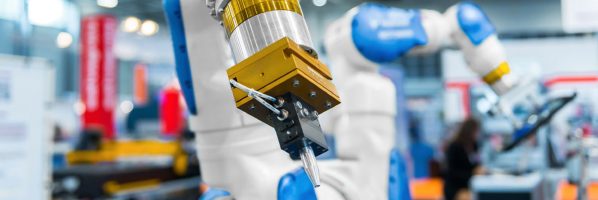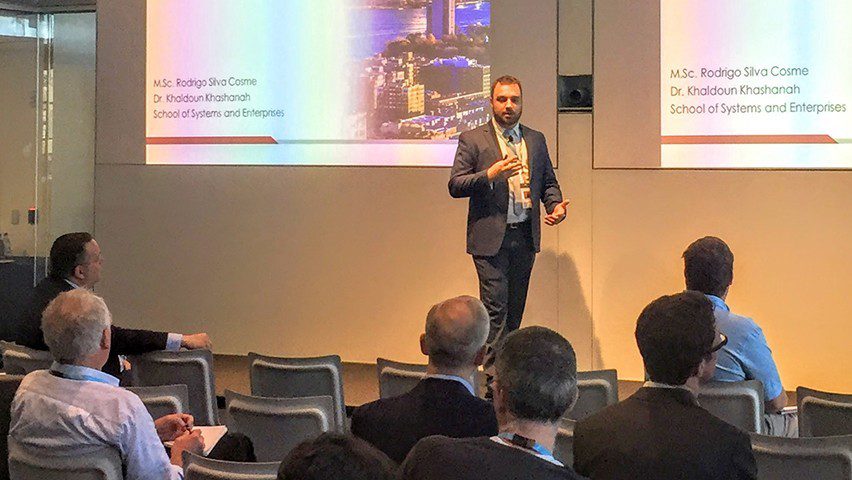News Roundup – Gies Online MBA Powers Illinois, Graziadio Professor on Women in the Age of AI, and More

Let’s take a look at some of the biggest stories from this week, including a Gies Online MBA helping power the state of Illinois.
Dr. Bernice Ledbetter Authors Opinion on Equipping Women with Opportunities to Thrive in Smart Machine Age – Pepperdine Graziadio Business School News
Dr. Bernice Ledbetter of the Pepperdine Graziadio Business School recently published her findings on the role of women in the age of AI.
A study by the McKinsey Global Institute found that smart machines will eventually perform the tasks performed by women in many business settings. Ledbetter’s research seeks to prompt lawmakers and policy makers to assist women in adapting their skill sets within this new landscape.
Dr. Ledbetter suggested three key guidelines to provide safeguards for women as work becomes automated—increase mentorship opportunities for women and outlets for women to hone leadership and utilize ‘soft skills;’ and to bolster investment in childcare and early childhood education. Women, according to research by the Institute for Women’s Policy Research, account for 58 percent of the workforce that will be affected by automation.
As the Dean of Students and Alumni Affairs at the Pepperdine Graziadio Business School and Director of the Pepperdine Center for Women in Leadership, Ledbetter works to inform and instruct on the issues faced by women in every sector of the economy. For more on her study and the future of AI in the workplace, read here.
Cardinal Health Partners with Vanderbilt Executive Education for Two Custom Leadership Programs – Vanderbilt Owen Graduate School of Business News
Vanderbilt University’s Owen Graduate School of Management has been leading a strategic partnership with Cardinal Health Partners to produce some of the best and brightest executives in the healthcare field.
The two programs, entitled INNOVATE and INSPIRE, are both nine months in duration. INNOVATE brings together thirty directors for assignments meant to help solve global healthcare issues. The directors, who reside at various international locations, meeting face-to-face six months into the program. At the end of the nine months, the team presents their projects to Cardinal executives who decide which ones they will implement.

Vanderbilt’s partnership with Cardinal Health Partners has brought two new healthcare executive programs to the Owen Graduate School of Management.
INSPIRE is comprised of fifteen Cardinal Health vice presidents whose goal it is to hone skills in entrepreneurial thinking, organizational management, and trend spotting. After deciding upon one ‘mega trend’, teams analyze how the trend is active within their organization and how it can be maximized for the best impact.
The intent of each program is to help executives and leaders to shift focus from operational concerns into more strategic and creative thinking. Jerome Revish is a Cardinal Health Vice President for Services and a participant in the INSPIRE program. He says:
“I’ve been at the VP level for a little over two years now. I would say as manager and director, you’re so focused on execution and driving results … It’s now, at this level and the next level, where more of your job is centered around framing the strategy of where we need to be going, versus ‘how do I execute what’s in front of me today.’”
For more on Owen’s executive education programs, read here.
iMBA Helps Power Windfree’s CEO to Power Illinois Homes and Businesses – Gies College of Business News
The University of Illinois Gies College of Business’ iMBA program has helped one entrepreneur to help bring solar power to the Midwest.
Eric Heineman is CEO of Windfree, Illinois’ TOP installer of solar panels for homes and businesses in the state. The iMBA, Gies’ 100 percent online degree, was a perfect choice for Heineman as he juggled the responsibility of raising children and pursuing his goal of creating a socially responsible business.
Crediting the “solar boom” in Illinois for part of his success, Heineman says, ““I don’t know how I would be able to stay in a master’s program if I didn’t have the flexibility of the iMBA. It’s something I’m very thankful for.” The iMBA has been a vital tool in Heineman’s advancement to CEO, as his business decisions are directly applicable to his online curriculum.
“It allows me to constructively second-guess everything I’m doing, and I have a great sounding board for my ideas,” he continues. Windfree was founded in 2009, and it has become a leader in providing solar energy to schools and other non-profit organizations. Windfree is responsible for the installation of numerous solar power devices in the state, including the Illinois Governor’s Mansion.
Heineman will complete his MBA in 2020. You can read here for more on Heineman, Windfree, and the iMBA.
2019 Massachusetts Family Business of the Year Award Winners – Northeastern D’Amore McKim School of Business News
Northeastern University’s D’Amore-McKim School of Business honored some of the state’s leading family businesses during an awards program last month. For over a decade, a panel of judges has chosen businesses that exemplify success, specifically through multi-generational legacies of their organizations. Community involvement and innovation are two other criteria upon which the winners are chosen.
The Clark School received an award for medium sized businesses. Provo Wealth Management Group won the Marshall Paisner Award for Small Firms. The Hub Folding Box Company took home the large business award, and the Award for Community Involvement was presented to J. Calnan & Associates.
For the last thirteen years, recipients of the Massachusetts Family Business of the Year Awards have been selected by a panel of independent judges based on the following criteria: business success; positive business and family linkages; multi-generational family involvement; contributions to the community and industry; and innovative business practices or strategies.
You can read here for more on the Family Business of the Year awards.
Kellogg Investigates Impact of Automation on Smaller Cities, and More – Chicago News

Let’s explore some of the most interesting stories that have emerged from Chicago business schools this week.
How Will Automation Affect Different U.S. Cities? – Kellogg Insights
Northwestern University Kellogg School of Management‘s Hyejin Youn, an assistant professor of management and organization, just published new research in which she and her colleagues explore the unique industrial impacts of automation on different cities across the country.
Youn predicts that automation will have a more pronounced impact on smaller cities whose industries are populated by easily automated jobs (think card dealers, cashiers, and accountants). These cities are likely to experience a hollowed out middle class precipitated by “an exodus of workers, as well as exacerbated income inequality.”
According to the article, larger cities with greater “shares of managerial and knowledge professions (like lawyers, scientists, and software developers), [which] require knowledge and skills that cannot easily be taught to a machine, they will offset the total impact of automation.”
You can learn more about Youn’s research here.
More Than Jobs Than Job Seekers in Elkhart – Mendoza Ideas & News
Fox 26 Houston recently interviewed Notre Dame Mendoza College of Business finance professor Jason Reed about a fascinating discovery that there are “more job openings in Elkhart, Indiana, than there are workers to fill them.” According to recent Labor Department statistics, this news is indicative of the realities of many communities in the Midwest.
You can watch the entire interview below.
In many cities there are never too many job openings, but here’s one city where the economy is so good that there are more jobs than there are workers to fill them. Fox News’ @MattFinnFNC reports. pic.twitter.com/lwfBAhGaBz
— Ivory Hecker FOX 26 (@IvoryHecker) April 9, 2018
Are You Ready For Personalized Pricing? – Booth Business Blog
University of Chicago Booth School of Business professors Sanjog Misra and Jean-Pierre Dubé have published new research that many companies have begun exploring “personalized pricing” or tailoring their prices to individual customers—a practice that dates back at least 150 years to the days of haggling with Wanamaker’s sales staff but is relatively nascent in the era of Amazon.
According to the article, the researchers found that by “testing a range of introductory prices for online job board ZipRecruiter, the company could have more than doubled its standard price of $99, increasing revenues despite the smaller number of customers willing to pay more.”
The practice is not without potential controversy, as Dubé explains: “In markets where prices are transparent and customers can easily figure out what other people are paying, that’s where you run the risk of a backlash.”
Learn more about the duo’s research here.
Northeastern Prof Talks About Amazon Automation and Future Shopping

After the emergence of Amazon Go, a cashier-less convenience store the e-commerce juggernaut recently opened in downtown Seattle, Northeastern University’s D’Amore-McKim School of Business explored the potential impact of automation on the future of commerce.
The simple concept behind Amazon Go is a streamlined mini-mart experience in which customers “scan their smartphones with an app [and] grab what they want.” DMSB Associate Professor of Marketing Strategy and Managerial Decision-Making Bruce Clark discussed the implications of what New York Magazine dubbed the “automated 7-Eleven killer.”
“Unless you have an Amazon Go next door to your store, I’m not sure this is a big deal. It’s not clear to me the customer experience of an Amazon Go store is sufficient to make me walk past the local 7-Eleven. Geography is destiny in this sense: where you have more convenient stores, you will do well. A longer-term threat might be if Whole Foods went cashier-free and you had a Whole Foods next to your convenience store.”
Clark is quick to point out that AI more commonly automates pieces of jobs rather than entire gigs and cites the advent of the ATM in the late 1960s and ’70s as a key example.
“Despite widespread adoption of ATMs, employment of bank tellers increased over much of the past three decades. The driving factor was that while a given bank branch might require fewer tellers, that reduction in labor costs meant that banks could open more branches, offsetting the loss at any given branch. Tellers’ jobs in turn became more like that of a customer service representative rather than a paper- and currency-pusher.”
Clark remains cautiously optimistic about the future of retail, according to reports.
“The common thinking is that over time, human jobs will evolve toward processes at which humans remain better value, notably in emotional intelligence and physical dexterity. Retail employees will find their jobs increasingly specified in those terms. You’re either interacting with customers or efficiently managing the stocking and layout of a store. Employees who excel in these areas should be okay.”
But perhaps less so about the future of employment across the board. “All that said, I’m not sure any of us should be assuming we will have stable, well-paid employment in the future.”
Stevens Alum Takes Disruptive FinTech Lessons Back Home to Brazil

ZeroBeta founder Rodrigo Silva Cosme, a MS ’16 Stevens Institute of Technology’s School of Business graduate, recently returned to his alma mater to present his master’s thesis, explaining how machine learning can apply to financial markets.
Cosme, who was invited by Professor Khaldoun Khashanah, explains; “The world is getting more automated, more efficient, more intelligent, and finance is no different. You need complete professionals who know how to code and also can handle the financial side of the business and implement solutions.” Cosme, who arrived in the United States with a “lifetime fascination with financial markets,” believes people who choose to trade by themselves can’t do it optimally.

Rodrigo Silva Cosme delivers his thesis at a recent Bloomberg conference at Stevens/Photo via Stevens.
The São Paulo-based ZeroBeta is a unicorn of sorts in the Brazilian market, which “lacks the liquidity that allows for more diversified risk in investment strategies.” The startup leverages algorithmic trading and portfolio optimization techniques to “build smarter strategies for trading.
Cosme continues, saying, “Instead of working for [hedge fund managers], we trade with them—we develop the strategies for the accounts, we make the trading decisions, and they do the commercial side of the business, getting customers and raising capital.”
Cosme attributes ZeroBeta’s success largely to the first-hand exposure he received at Stevens to the myriad ways that finance and technology can intersect. “What I do at my job, every day, is what I learned at Stevens — from trading option spreads, to coding through C++ design patterns, to portfolio rebalancing. If you’re not able to find the answers with the kind of resources Stevens has, you can’t find them anywhere.”
Stanford Hosts Future of Work Symposium

The recent Stanford “Future of Work” symposium, co-presented by Stanford Career Education and OZY EDU, explored a number of topics related to a changing labor force in the face of automation, and what a more expansive definition of continuing education might entail.
Coursera CEO Jeff Maggioncalda SGSB ’96 and one of the panelists, believes that college degrees “will remain useful to build fundamental skills,” but that even college-educated members of the labor force “will be expected to continue their education throughout their careers” in order to stay competitive.
This is especially true for graduates with humanities and social science degrees, whose knowledge, according to Stanford’s Senior Vice Provost for Education Harry Elam, Jr. remain crucially important to helping industry “understand biases in data, facilitate collaboration, bring insight, provide historical perspective, and humanize technology in a data-driven world.”
GSV Asset Management co-founder Michael Moe believes that humanities and social science graduates can help us augment “the three R’s” with “the four C’s”: critical thinking, communication, creativity, and cultural fluency.
MindSumo co-founder and current Stanford GSB student Trent Hazy believes people with humanities and social science can “easily develop transferable skills that employers value. Humanities majors who also learn some quantitative skills by taking classes in statistics or logic will have an advantage over those who don’t.”
Coursera VP and Stanford GSB ’10 grad Julia Stiglitz believes startups like hers open up “educational opportunities … to anyone who has the will and desire and ability to go through it, and as a result I think we’re going to see all sorts of new people come into fields they otherwise wouldn’t have access to.”
When it comes to the projected 2030 obsolescence of half of today’s jobs by automation, all the speakers firmly believed that technology will create “new economic opportunity” in the long-term. Moe concludes: “While automation eats jobs, it doesn’t eat work.”
Stevens Hosts Lecture That Explores Morality of Artificial Intelligence

Fear of artificial intelligence is as real as Ryan Gosling’s smooth, calming skin in Blade Runner 2049. But is our future really doomed to despair because of sensual robots? Dr. Oren Etzioni recently spoke of the prognostication, as part of the Stevens Institute of Technology‘s President’s Distinguished Lecture Series (PDLS).
